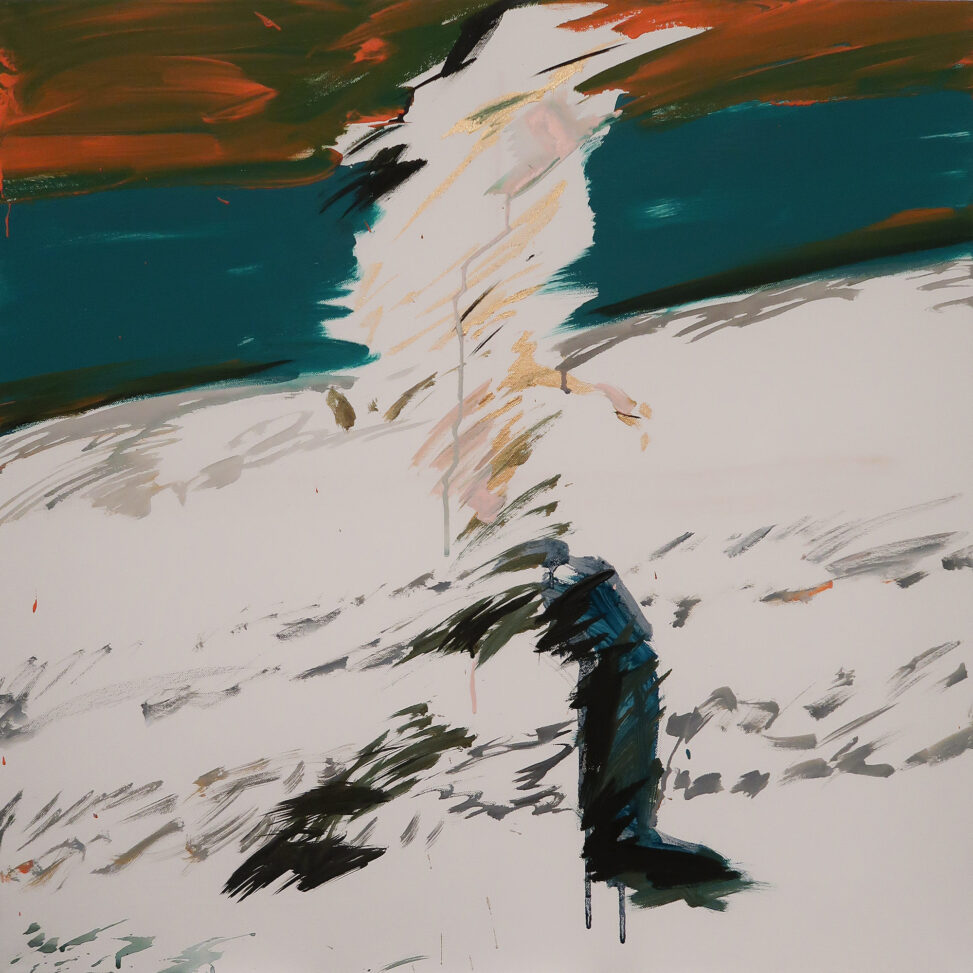Elia, (born in Adria — Italy as Alessandro Greggio in 1968) died falling from a window in August 2005. In the midst of a career that can barely be called successful, I don’t think Elia commited suicide. He was too much of a bon vivant to consider such a possibility. If, as an artist, his satisfactions were limited to his paintings, he was used to the fact that the Italian art world, in its self-centered provinciality, was not interested in him. He was an outsider, well conscious of it, he didn’t mind — or maybe he did, but didn’t show it — and he accepted his condition and went on painting in the solitude of his studio, knowing that he was slowly getting somewhere. And he was. Many a time I told him to put together a portfolio of his abstract paintings, get a one way ticket to New York and try his luck over there. He never did, and probably his main obstacle was the fact that he was too broke to fly over. A happy chap, he knew everyone in Bologna, yet his deep blue eyes revealed nothing of himself, and it’d take you forever to find out more about him. Yet he was always eager to show you his paintings, and quite a successful representative of himself he was: since he left Adria to study art in Bologna in 1987 he never held a day job, and lived off his paintings and his hands. An amazing craftsman, he would make awesome furniture and woodwork for whoever asked him to, and some Bolognese shops are completely decorated by Elia. The saying was “you either go to Ikea, or ask Elia”. But all this was just a way of living. He didn’t care about objects anymore – all he wanted to do was paint. His early works were strongly influenced by Man Ray, and they closely resemble his Objects of affection. Even though his style developed into something completely independent, Elia’s love for Man Ray was evident throughout his career, in the way he used painting almost with disrespect. He was very careful about matter and materials, yet, in his desperate and continuous questioning of himself throughout the creative process, he would immediately scramble what he created, starting a drawing with figuration then deforming it into something else more unclear, more uncertain. Elia knew well that he would die young, and he would inform you of that when he got to know you well. Once he wrote to me that he was tired of sticking objects on his canvas (he obviously couldn’t help it, as he never stopped) and that all he wanted to do was concentrate on the action of the brush on the canvas, underlying the flatness of the process. This was hard for him, as found materials had always been the perfect canvas for him, with all the imperfections that he loved so much. He was a master of transforming anything new into an antique object–that’s why everyone loved his furniture so much. But he wanted to stay away from that and concentrate on what he had inside, on paintings and nothing else. In order to do that he knew he had to live for the moment. His way of painting, with the mistakes, the dripping, the furious erasing and the liberating use of the white, needed the here and now. In the same letter he told me that he didn’t want to try to get shown anymore, and that life can’t be planned in advance. This was early in his career and this decision would further him away from galleries and the art system. Thus his exhibitions had to happen with little advance notice, in bars as much as in shops, and sometimes in real galleries. The exhibiting space wasn’t that important. He cared about the people who would come and see the work and get something from it, so he made no social distinction between anyone. You’d see him in the underground bar drinking with a dodgy guy one night, at a high-class party a day later, talking to a wealthy lady. And as the bon vivant he was you’d wonder when he made his paintings, as you’d always meet him around town. He knew everyone in Bologna, and Bologna misses him and his paintings. His mixture of energy and desperation that, translated into color, became an abstract, serious search for the perfect painted act.
Stefano W. Pasquini

cristina
What an excellent project The Book of People and what a beautiful tribute to Elia!
Thank you Stefano